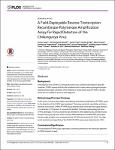A Field-Deployable Reverse Transcription Recombinase Polymerase Amplification Assay for Rapid Detection of the Chikungunya Virus
Patel, Pranav
Wahed, Ahmed Abd El
Faye, Oumar
Prüger, Pauline
Kaiser, Marco
Thaloengsok, Sasikanya
Ubol, Sukathida
Sakuntabhai, Anavaj
Leparc-Goffart, Isabelle
Hufert, Frank T.
Sall, Amadou A.
Weidmann, Manfred
Niedrig, Matthias
Background: Chikungunya virus (CHIKV) is a mosquito-borne virus currently transmitted in about 60 countries. CHIKV causes acute flu-like symptoms and in many cases prolonged musculoskeletal and joint pain. Detection of the infection is mostly done using RT-RCR or ELISA, which are not suitable for point-of-care diagnosis. Methodology/Principal Findings: In this study, a reverse transcription recombinase polymerase amplification (RT-RPA) assay for the detection of the CHIKV was developed. The assay sensitivity, specificity, and cross-reactivity were tested. CHIKV RT-RPA assay detected down to 80 genome copies/reaction in a maximum of 15 minutes. It successfully identified 18 isolates representing the three CHIKV genotypes. No cross-reactivity was detected to other alphaviruses and arboviruses except O'nyong'nyong virus, which could be differentiated by a modified RPA primer pair. Seventy-eight samples were screened both by RT-RPA and real-time RT-PCR. The diagnostic sensitivity and specificity of the CHIKV RT-RPA assay were determined at 100%. Conclusions/Significance: The developed RT-RPA assay represents a promising method for the molecular detection of CHIKV at point of need.
No license information

